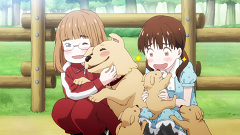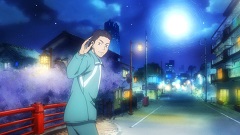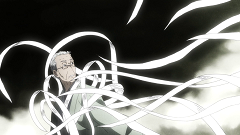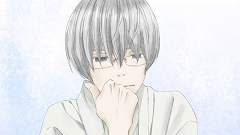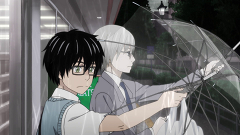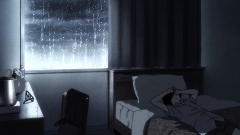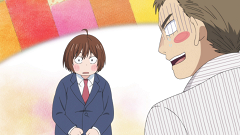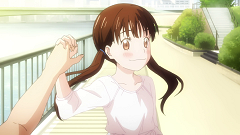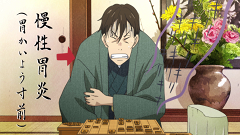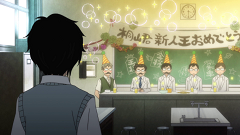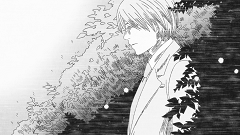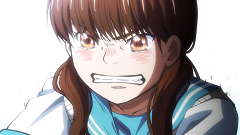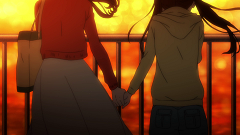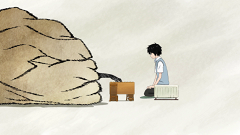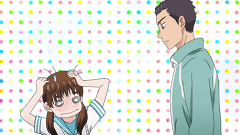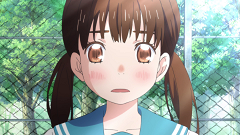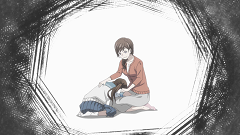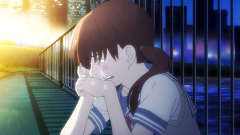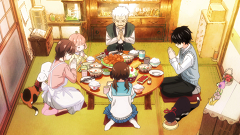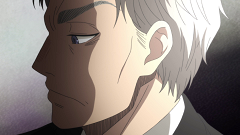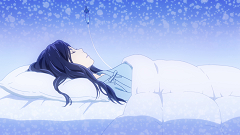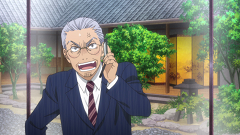During the bizarre cold open of this makeshift two-parter, the thought flashed across my mind: are we getting one last bit of frivolity before the other shoe drops, or is wackiness the new normal for 3-gatsu? Over the last couple weeks, we’ve witnessed a lot of exaggerated behavior from characters like Hiyashida-sensei, Nikaidou, and even Rei himself, and as much as it pleases me to see everyone enjoying shogi and loving life, I’ve been waiting for the series to take a dramatic turn. I’ll even confess to experiencing a sinking feeling as Rei’s self-proclaimed rival engaged in his usual hysterics during “June,” wondering if the rest of this season was going to be more of the same. But if you’ve seen both of these episodes (which you almost certainly have, since this post is weeks overdue), you already know that my worrying was in vain. From the moment Akari opened that door to reveal her sister’s mismatched shoes and teary eyes, this show put me through an emotional wringer as powerful as anything from its first season. 3-gatsu, I’m sorry I ever doubted you.
Apart from the inherent injustice of Hinata’s circumstances, what makes her story particularly effective is how strongly Rei can relate to her. He’s been bullied for a good portion of his life, whether it was being labeled a robot on the class chalkboard, having a classmate refuse to sit next to him on a field trip, or getting cans full of rocks chucked at his head. As a quiet, introverted kid, made more quiet and introverted by the death of his biological family, Rei was a perfect target for bullying by exclusion. The show even refreshes our memory on the subject just before telling Hina’s story, so it’s easy to identify her withdrawal at home as a symptom of bullying. When the truth finally comes out, Rei is horrified to realize that the pain he once felt is now being visited upon someone who has always supported him. And when Hinata bolts from her house, filled with shame and self-loathing, there’s no question of who will follow. The only thing he manages to say before sprinting after her is, “I will.”
Bullying in Japan is often characterized by its intensity, and the scope with which it’s carried out. Entire classrooms can ally themselves against individuals in the name of conformity, and even teachers may be complicit, as they are in this case. Though Hinata’s sensei refuses to acknowledge the abuse occurring just under her nose, kind-hearted Hina could never abandon a friend, so she sits with Chiho during lunch and sticks up for her in class. But Chiho eventually changes schools, and the bullies shift their sights to the closest remaining target. After Hinata recounts all of this to her family, she begs through her sobs for Akari to tell her what she ought to have done to save her friend. But later, as she confesses her fear and sorrow to Rei on that bench by the river, she starts on the long journey of putting herself back together. With big Ghibli tears dripping down her face, she raises her voice and screams in defiance of her classmates, teachers, and culture that what she did was right.
That was the moment where I lost all control. How could Hinata, who never goes anywhere without a smile, be reduced to this scared and angry state? How could the incompetents running that school allow any of this to happen? The girls who stole her shoes could work their whole lives and still fail to pay for the hurt they caused her. I was furious – but Rei, despite all the bullying he’s endured, had a different reaction. His promise to Hinata, to stay with her and to spend the rest of his life paying her back for her kindness, closely resembled a marriage proposal, and his commitment felt just as strong. He even got down on one knee before making his big declaration, which I’m sure was a conscious decision on Umino-sensei’s part. When Rei described the feeling of being saved by Hina’s courage, it struck me that both of these characters are uniquely positioned to help the other. Hinata’s good nature allows her to extend warmth to people who dwell in dark places, and Rei’s familiarity with that darkness enables him to lead others out of it. This episode, more than any other, has convinced me of their suitedness for one another, and of my love for this series. May it continue for years to come.
Some other thoughts about these episodes:
– Though Rei’s initial reaction by the river is one of dedication and compassion, he later thinks to himself that he wants to rip Hina’s tormentors limb from limb. Episode 26 even closes with him wracking his brain for a way to improve her situation, so we haven’t reached the end of this story yet.
– The symbolism behind the ladybug in “Ladybug Bush (Part 3)” was a stumper for me, perhaps because of the language barrier. I did a little Googling, and it turns out that aside from the general superstition of ladybugs bringing good luck, they can also represent impending happiness, or the idea that one’s troubles have come to an end. Hinata would welcome either possibility, I’m sure.
– Someji’s commendation of his granddaughter’s courage warmed my heart (and what a fantastic lesson for little Momo), but even more moving were the contents of the dinner that Akari prepared for her little sister: deep-fried chicken, potato salad, and cream stew, all of Hinata’s favorite foods. The fictional moments that touch me most are always the ones where people are good to each other.

